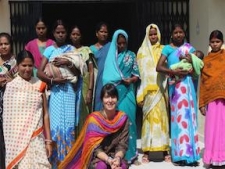Originally posted by Madison Hamilton on McCombs Today.
 Adrienne Robinson, MSTC ’10, is a pioneer in the health care industry. The McCombs School of Business graduate has been working for Merck, a leading health care company, for nearly 19 years. Recently Robinson had the opportunity to spend three months in India working with Interactive Voice Response (IVR) technology. The IVR device, much like a cell phone, uses pre-recorded messages to teach women in India about maternal care. “We were educating them about what is respectful treatment, cleanliness standards, services they should expect, and lastly, how long they should wait for any of these services,” says Robinson. Furthermore, Robinson taught these women about government entitlements such as cash benefits and free transportation to the hospital.
Adrienne Robinson, MSTC ’10, is a pioneer in the health care industry. The McCombs School of Business graduate has been working for Merck, a leading health care company, for nearly 19 years. Recently Robinson had the opportunity to spend three months in India working with Interactive Voice Response (IVR) technology. The IVR device, much like a cell phone, uses pre-recorded messages to teach women in India about maternal care. “We were educating them about what is respectful treatment, cleanliness standards, services they should expect, and lastly, how long they should wait for any of these services,” says Robinson. Furthermore, Robinson taught these women about government entitlements such as cash benefits and free transportation to the hospital.
Robinson spoke with us about her project in India, her time at McCombs, and her advice for students.
What drew you to the MSTC program?
I am fascinated by the concept of enabling innovation. I was originally searching for a master’s program purely about the science of innovation, and then I found the Masters in Technology Commercialization program.The MSTC program appealed to me not only because of The University of Texas at Austin’s reputation, but I [also] found the curriculum to be practical for my professional needs. I was also very drawn to being in a program that was for seasoned professionals from multiple industries. I thought this would lead to more diverse dialog and interactions. Lastly, from a personal standpoint, I wanted both a classroom experience as well as the web interactive mechanism since I live in the Northeast and couldn’t fly down every other weekend but could [attend classes] monthly.
What advice would you give to McCombs students?
Your time with MSTC goes fast, and it’s a safe place to really grow your expertise. Pick as many projects as you can to expose yourself to the different industries and technologies and try to apply the knowledge you’ll be gaining in MSTC.
You will do a fair amount of team project work. In that project work, be sure to take different roles than what you normally might choose. You’ll get more horizontal knowledge by learning other areas that you aren’t as comfortable with.
Networking isn’t just for the workplace. While you are in MSTC, you not only have access to great teachers, but your fellow students [also] have a wealth of information. Make sure you develop as many relationships as you can so you can learn from those around you.
When did you start working in the health care industry? And what influenced that decision?
I decided I really wanted to work in pharmaceuticals because of its mission. I’ve been at Merck now for 19 years, and I’ve really loved being part of a company that puts applying innovation to the patient at the center of its mission.
How do you think new technology is affecting the pharmaceutical industry?
We are striving to expand from purely a pharmaceutical company to a healthcare company. We’ll be looking at the full range of preventive options, as well as diagnosing, treating, and managing disease. This means diagnostics, monitoring, personalized medicine, healthcare services, etc. These will all be new technologies and we’ll have to figure out how they fit into our long-term strategy.
What project are you currently working on?
I was selected as a Richard T. Clark Fellow for a program established by our previous CEO. Its intent is to offer seasoned experts to help solve world health problems. I spent three months in India testing an innovative technology that was developed by a small startup company to address the significant problem of maternal mortality in India.
I was on loan to an NGO (non-governmental organization), called CEDPA (Centre for Development and Population Activities). I was working with the small startup, Gram Vaani, to conduct a feasibility study and implementation plan for using the Interactive Voice Response (IVR). Much like a mobile phone, this new technology is already in use for educating the rural poor about social change issues and government corruption complaints. In this particular case, my project was to modify this technology for a slightly different approach and use it as a mechanism to educate, empower, and activate women in maternal care. Not only would these women be educated via this communication method, but they would also be able to leave their feedback.
Since we went live with the system in November, we’ve found that the women are able to use the system and they really love it. I conducted focus groups with patients who are using the system and it was so neat to see their excitement [in response to] how this is improving their lives. Also, the government is very interested in seeing the feedback about their public hospitals. The real measure, of course, is if the death rate due to childbirth will be reduced, which will be measured over time.
It was a life-changing experience, and I can also say I absolutely applied skills I learned in the MSTC program.
